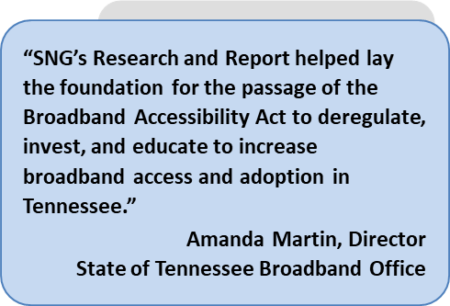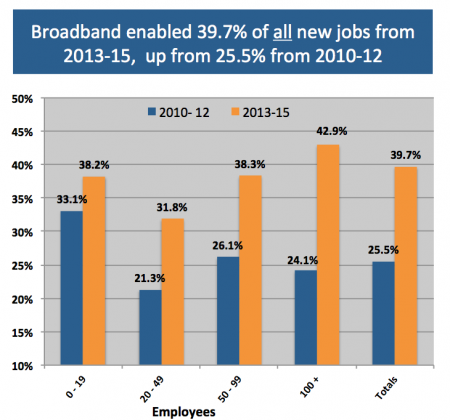Effective Broadband Policies, Strategies, and Programs Need Relevant Data.
Local, regional, and federal governments and other public agencies focused on bridging broadband gaps need data and evidence to build buy-in for policies and programs that enable the effective deployment and practical use of high-quality broadband.
 Governments at a federal and state level in particular have a key role in establishing policies that recognize the importance of broadband for economic growth and social equity. For example, approximately half of American States have broadband offices that develop programs and collaborate with regions and other agencies to strategically drive for greater broadband availability as well as to leverage investments for positive outcomes. Ultimately, these broadband policies, strategies, regulations, and programs must benefit communities and their citizens, businesses, and institutions.
Governments at a federal and state level in particular have a key role in establishing policies that recognize the importance of broadband for economic growth and social equity. For example, approximately half of American States have broadband offices that develop programs and collaborate with regions and other agencies to strategically drive for greater broadband availability as well as to leverage investments for positive outcomes. Ultimately, these broadband policies, strategies, regulations, and programs must benefit communities and their citizens, businesses, and institutions.
The development of effective and outcome-oriented broadband policies and programs requires empirical evidence and fact-based analysis to provide the necessary insights and build buy-in on:
- What is the current situation?
- What and where are the gaps?
- How do we address the needs and opportunities?
Where investment is being considered – whether in infrastructure or support programs – the costs and the economic returns on investment should also be assessed.
How We Help
 SNG has decades of experience in conducting primary data collection on broadband access and utilization, from which we develop actionable insights and strategies to maximize broadband impacts for users and the economy. In working with numerous states and regions, SNG has amassed an industry-leading Digital Economy Database that benchmarks hundreds of metrics on internet use and its benefits and impacts on households, businesses, and community institutions. Understanding the demand drivers for broadband, coupled with impacts and barriers, provides essential input to effective policies and well-targeted programs.
SNG has decades of experience in conducting primary data collection on broadband access and utilization, from which we develop actionable insights and strategies to maximize broadband impacts for users and the economy. In working with numerous states and regions, SNG has amassed an industry-leading Digital Economy Database that benchmarks hundreds of metrics on internet use and its benefits and impacts on households, businesses, and community institutions. Understanding the demand drivers for broadband, coupled with impacts and barriers, provides essential input to effective policies and well-targeted programs.
Governments and agencies at all levels can benefit from SNG’s industry-leading practices to benchmark their current state of broadband use and uncover needs and issues from research and analysis tailored to your goals. Where investment is also being considered we apply a “holistic approach” that assesses both the demand drivers and the supply-side needs.
Learn more about research for effective broadband policies and strategies at Developing policies that help communities
Gathering and Using the Right Data
States have made progress in addressing broadband needs for their citizens and data on broadband availability has greatly improved. Nonetheless, broadband continues to be an issue because many citizens and businesses still do not have access to the quality broadband they want and need – plus they need the awareness and skills for their effective use of online practices. Without access and practical use of broadband, they risk falling behind in an increasingly online world. As a consequence, their communities risk diminished relevance and limited economic growth opportunities.
The challenge before us is how to “finish the job” to ensure that all communities and their citizens and businesses have access to the quality broadband that they want and need. This requires the right data to inform decisions and practical methods to address the issues at a community level. The State has an important role in facilitating and supporting communities that do not have the resources to take action on their own.
State and local leaders need empirical evidence and an impartial assessment of:
- Whether businesses and households have access to the broadband they want and need;
- Which communities have the greatest need and are motivated to take action; and,
- Whether an investment in infrastructure pays-off for their community/region?
Collecting empirical evidence to identify gaps and define problems is the first step in building buy-in and developing actionable strategies. Strategic Network Group’s proprietary eSolutions Benchmarking was developed for that purpose. It is an objective state-of-broadband assessment that nine states have used to identify goals and develop strategies to improve broadband services and drive the benefits from using the internet. While your State may have collected data in the past, you need the right data to be empowered to take the right actions.
Once broadband gaps have been identified, the State can use the data to develop solutions in partnership with communities and regions. The process of building buy-in and determining which gaps to address should focus on which broadband investments pay for themselves. The Economic Feasibility Assessment for a community, county, or region uses SNG’s normative database and proprietary analysis tools to quantify the local benefits of addressing local broadband needs. Completing an Economic Feasibility Assessment is the foundational planning step for a state working with local leaders to answer an important question: does this infrastructure investment pay off for our community/region?
The Economic Feasibility Assessment is conducted at the community level with the full participation of municipal/county leaders. It recognizes that, for communities, broadband is more than about simply providing internet access. It is about providing an essential infrastructure for innovation and growth, but it must be done in a way that is affordable and sustainable. The Economic Feasibility Assessment empowers local leaders to take control of their broadband future affordably and without taking on unacceptable risks.



